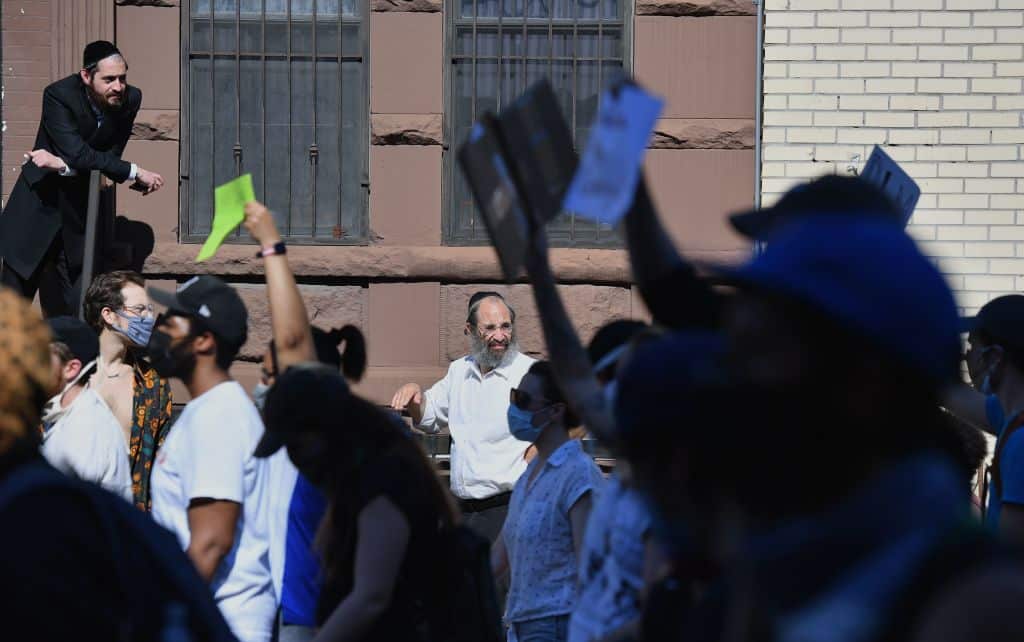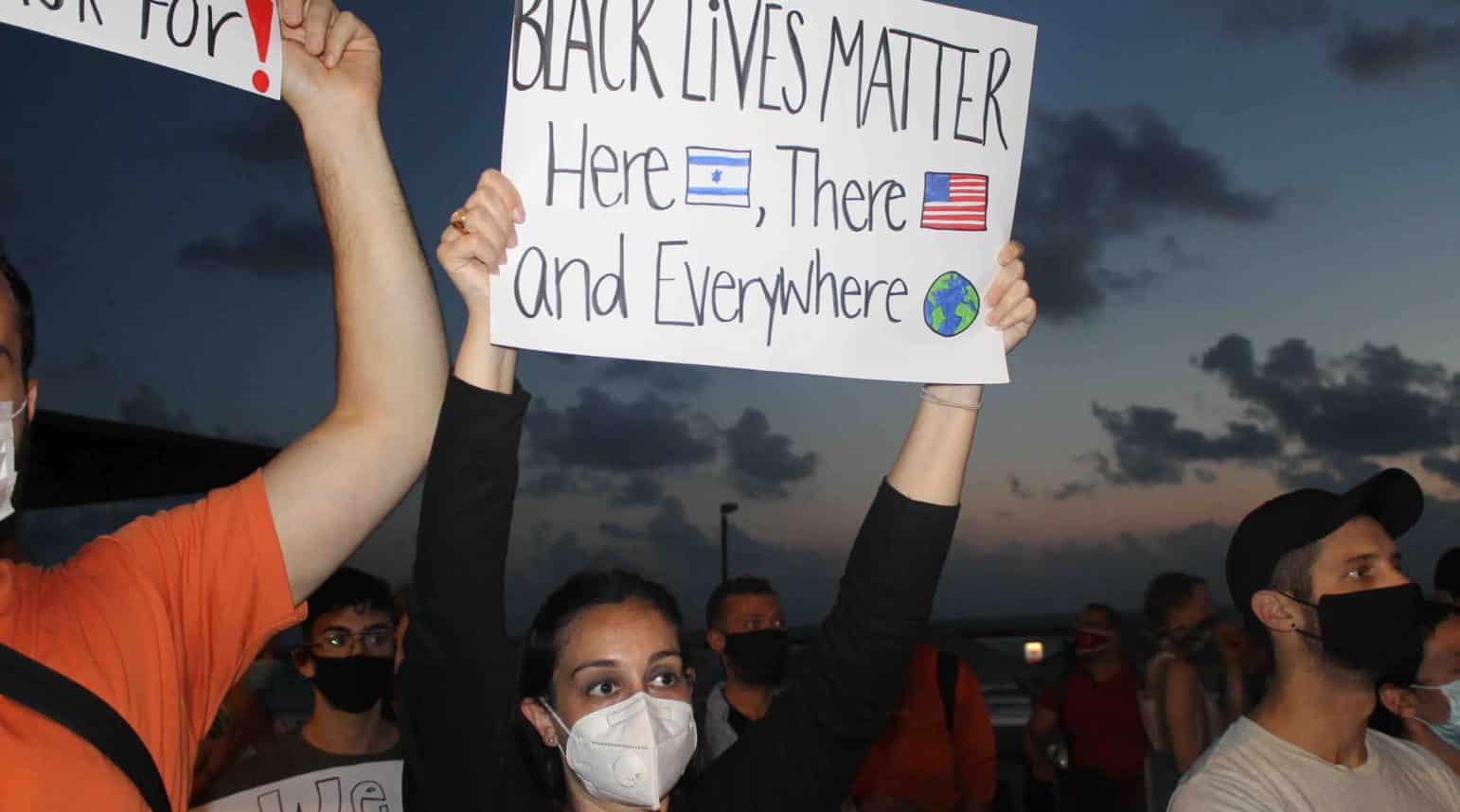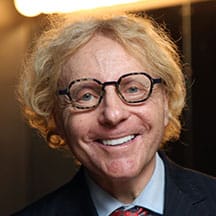 Members of the Orthodox Jewish community watch as protesters walk through the Brooklyn borough on June 3, 2020, during a “Breonna Taylor and Black Lives Matter” protest in New York City, after the recent death in Minneapolis police custody of George Floyd. – Derek Chauvin, the white Minneapolis police officer who kneeled on the neck of George Floyd, a black man who later died, will now be charged with second-degree murder, and his three colleagues will also face charges, court documents revealed on June 3. The May 25 death of George Floyd — who had been accused of trying to buy cigarettes with a counterfeit bill — has ignited protests across the United States over systemic racism and police brutality. (Photo by Angela Weiss / AFP) (Photo by ANGELA WEISS/AFP via Getty Images)
Members of the Orthodox Jewish community watch as protesters walk through the Brooklyn borough on June 3, 2020, during a “Breonna Taylor and Black Lives Matter” protest in New York City, after the recent death in Minneapolis police custody of George Floyd. – Derek Chauvin, the white Minneapolis police officer who kneeled on the neck of George Floyd, a black man who later died, will now be charged with second-degree murder, and his three colleagues will also face charges, court documents revealed on June 3. The May 25 death of George Floyd — who had been accused of trying to buy cigarettes with a counterfeit bill — has ignited protests across the United States over systemic racism and police brutality. (Photo by Angela Weiss / AFP) (Photo by ANGELA WEISS/AFP via Getty Images) The police brutality that resulted in the death of George Floyd — literally taking his breath away as he pleaded for air — is an unspeakable act committed by the very people whose job it is to serve and protect.
What followed Floyd’s death, however, has not produced the same level of moral clarity. A national groundswell of social upheaval and racial unrest has led to contradictory messages and feeble responses from governors, mayors and law enforcement.
The demonstrators, at times, marched in different, competing directions. Most were peaceful, chanting, “Black Lives Matter,” a statement so obvious that it’s a national disgrace that someone had to coin it. Others resorted to violent tactics, such as setting police precincts and cars aflame, and looting businesses.
Some have drawn a moral equivalence between peaceful and violent actions — Floyd’s death demanding the gloves come off on order and civility.
Two dozen cities ordered curfews. Sixteen called in the National Guard. President Donald Trump threatened to mobilize the military. Crowd control has been chaotic. Protestors clashed with the police in Los Angeles, New York and Washington, D.C. Some Miami police officers took a knee alongside demonstrators. Widespread looting was obviously not a law enforcement priority. Meanwhile, there is talk about defunding police departments.
Social distancing, which ruled our lives for two months, suddenly was circumvented by social justice. Masks now were seemingly optional. Social activism may not cure a global virus, but it makes for an excellent distraction.
A national groundswell of social upheaval and racial unrest has led to contradictory messages and feeble responses from governors, mayors and law enforcement.
The aftermath of Floyd’s death has been maddening. One thing, however, was a constant at all rallies — the presence of Jewish protestors.
A righteous gesture for sure, but if history is any guide, it will end in feelings of betrayal.
The Jewish affinity for protest is nothing new, especially on behalf of African Americans. Jews were instrumental throughout the civil rights movement, serving on the front lines in creating the NAACP and its Legal Defense Fund. In the 1960s, they joined the Freedom Riders in disproportionate numbers; two of the three victims in the “Mississippi Burning murders” were Jews. And, of course, there are the iconic photos of Rabbi Abraham Joshua Heschel, and many other Jews, marching alongside Rev. Martin Luther King Jr. in Selma and Montgomery, Ala.
Years later, however, the Black Power movement — Malcom X, Nation of Islam, Black Panthers — decided that Jewish involvement in civil rights was no longer welcome. Jews fell from civil rights grace during the 1968 Brownsville teachers’ strike in New York. Allegations swirled that Jews were slumlords. Suddenly, demonized, their contribution to civil rights was maligned as either nonexistent or overrated.
This warping of history developed rifts among African American leaders. King and activist Bayard Rustin were devout Zionists, and defended any charge that Jewish self-determination was racism. Malcolm X regarded Israel as land-grabbing Palestinian oppressors.

Jews deliberately were left out of the 2014 feature film “Selma,” whitewashed from the historical record, invisible in the march and overall struggle. The Klan clubbed heads, but only those belonging to African Americans. Rabbi Heschel linking arms with Rev. King never even made it onto the cutting room floor.
Several founders of the Woman’s March in 2017, organized to express opposition to President Trump’s victory, were Jewish. During their first meeting, two women of color reportedly read them the riot act: Jews oppress minorities and financed the slave trade, so keep quiet and show respect. A new movement with shared progressive politics and a mandate of inclusion denounced its Jewish members with anti-Semitic canards.
Degraded and stripped of influence, the Jewish women soon left.
Notice a pattern?
Black Lives Matter was ostensibly created to end systemic racism in the criminal justice system. But it’s not a single-issue enterprise. They also are staunch supporters of the boycott, divestment and sanctions (BDS) movement against Israel.
Worse still, they have perpetuated the falsehood that police methods targeting black and brown people are exported from Israel — a new look to an old Blood Libel. (Since 9/11, some American police officers have been sent to Israel to learn counterterrorism techniques. Chokeholds they already know.)
In death, Floyd is being exploited as a pitchman. Painted on the security fence along the West Bank is Floyd dressed in a keffiyeh; behind him, a PLO flag. An African American who died while in police custody cynically has been transformed into a poster boy for Palestinian statehood. (Jesus received this treatment, too.) Does anyone affiliated with Black Lives Matter, let alone Floyd’s family, mind that he has been hijacked for this anti-Zionist purpose?
It’s all yet another insidious manifestation of intersectionality. On college campuses, all oppression is bundled into one united grievance — even if it creates absurd bedfellows. Homosexuals, feminists and African Americans might find themselves beheaded in Gaza or Ramallah, and yet they are passionate advocates of BDS.
Anti-Semitism, however, doesn’t qualify for intersectional solidarity. Why? Because Jews are perceived as privileged white people, inalterably consigned to the oppressor’s camp.
Whiteness is the new scarlet skin of shame, a stigmatic sign of moral deficiency.
Jews who marched proclaiming that Black Lives Matter may soon see their efforts devalued, their motives questioned. All those hearts bleeding and chests beating and tikkun olaming might do well to brace for a major disappointment.
A cruel kind of Jewish heartbreak will remain.
Look at Israel, an agile first-responder for emergency situations around the world. Yet, its Yoni-on-the-spot approach to human suffering receives little fanfare and gratitude, especially at the United Nations, where condemning Israel for not living up to a standard expected of no other state is a cherished pastime.
Perhaps it all shouldn’t matter. It’s still the right thing to do. After all, many Jews claim that their Judaism is expressed not through Torah-learning or ritual-keeping, but the concern for others.
Is it really so important that Black Lives Matter care whether Jewish and Israeli lives matter?
These are strange times. With so many now wearing masks, it’s entirely possible that, in the future, the person trampling over you is the same one who once marched beside you.
Thane Rosenbaum is a novelist, essayist, law professor and Distinguished University Professor at Touro College, where he directs the Forum on Life, Culture & Society. His work has appeared in major national and global publications. His most recent book is titled “Saving Free Speech … From Itself.”























 More news and opinions than at a Shabbat dinner, right in your inbox.
More news and opinions than at a Shabbat dinner, right in your inbox.